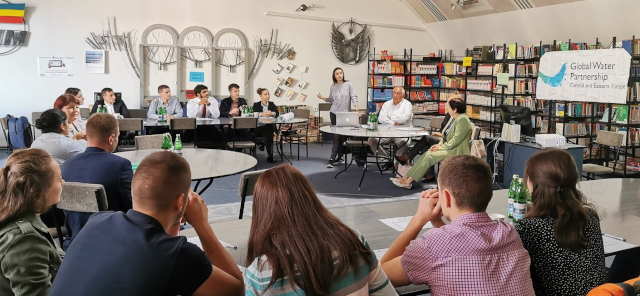Background
The Youth Voices Policy Choices initiative aims to empower a new generation of leaders in water sector, to strengthen the trust and motivate them to become agents of change at different levels, starting with their own communities. The initiative started in 2018 when a series of regional dialogues were organized to put the grounds of a facilitated exchange of opinions, knowledge and experiences between the youth and policy makers of Central and Eastern Europe, jointly developed by the Global Water Partnership Central and Eastern Europe (GWP CEE), Solidarity Water Europe, and Youth Water Community Central and Eastern Europe (YWCCEE).
After the successful chain of regional dialogues in Warsaw (July 2018), COP 24 in Katowice (December 2018) and World Water Week in Stockholm (August 2019), GWP CEE and emerging young leaders from Central and European countries organized National Dialogues aiming at laying the foundations for better communication between young people and the decision-makers in the respective countries. From September to November 2019, eight National Dialogues were organized in Bulgaria, Hungary, Latvia, Moldova, Poland, Romania, Slovenia and Ukraine, bringing together the total of 159 young water professionals and 187 policy-makers and representatives academia and local authorities.
Main topics
The main topics focused on the efficiency of national water governance structures, IWRM implementation and cross-sectoral approach, the challenges of youth inclusion in decision-making processes and possible solutions for improving the intergenerational dialogue. The issues revealed during national dialogues were diverse, yet the conclusions were similar as most of the participants agreed upon the need to increase both the institutional and individual attention towards IWRM.
For institutional attention, it was highlighted that government should set water resources as a priority, focus on better distribution of roles and responsibilities, as well as communication between state institutions, and the society.
For individual attention, it was unanimously concluded in all 8 countries that it is imperative to focus on educating the society about water resource management and the impact of current water usage behavior. The lack of easily accessible and current information about water resource management in media and schools is affecting the future of solving management and employment issues in water sector. If the general knowledge of efficient water resources management is not ensured at basic level, the interdisciplinary approach will not be achieved in required time and quality.
There is a clear deficit of mentoring, supervision and assistance from sectorial stakeholders. Even the existing - yet not sufficient - internships are too short, too simple or too bureaucratic to prepare specialists willing to further dedicate their professional energy to this sector. Valuable insights into water governance would help eliminate the emergent inter-generational holes in a state structures and institutions.
Improving the intergenerational dialogue
The improvement of the intergenerational dialogue was a top issue in all eight countries, acknowledged by both young professionals, decision-makers and senior water experts. All the participants agreed that more interaction between generations is needed and participation in joint activities like dialogues, debates or workshops, summer schools, conferences and forums on this topic can break down certain communication barriers between adults and young people. One of the concrete recommendations was creation of internship programs that would facilitate the exchange and transfer of information and provide opportunities to collaborate with various stakeholders while writing the student dissertations.
In Bulgaria, Moldova, Romania and Ukraine the participants agreed on establishing a national network and supporting the organization of relevant dialogues on a permanent basis. „AnnualNational Dialogues means that the event can grow every year and gain in popularity - attracting more students and decision makers to take action together” said Ziga Scuvkot, President of Youth Water Community CEE. Engaging in educating the rural communities about water management and investing in the creation of internship and mentoring programs from resort institutions are the other two mandatory steps that were recognized during the dialogues.
Youth Voices at Budapest Water Summit
The outcomes of the National Dialogues culminated in the session The urgent need for effective inter-generational dialogues at Budapest Water Summit 2019, where the young leaders shared the messages, challenges and possible solutions, which were identified during the national events. They asked demanding questions about their role in achieving water security, and they pointed out the urgent need for trust and improved communication, for better pathways for including youth in water governance.
In a real inter-generational dialogue, experienced water experts responded to youth’s questions, provided their points of view and encouraged them to be even more active and daring in their engagement. Balazs Heincz of the Hungarian Ministry of Foreign Affairs reassured youth that fresh knowledge is much needed and sought in water governance and advised youth to channelize their ambitions and find their focus. „My appeal to you is to seek us the way we seek you. It is a win-win solution for all of us if we want to achieve better water management”, urged the youth Helene Masliah-Gilkarov of ICPDR. "Be courageous to move from one box to another and think out of the box”, stressed out Guy Bonvin, Swiss Special Envoy for Water in Central Asia. The perspectives and recommendations of youth were later submitted to be included in the Budapest Appeal 2019.
The outcomes of the eight national dialogues under the initiative Youth Voices Policy Choices will be presented at COP 25, at 16:30-18:30 on 9 December at the EU Pavilion.
